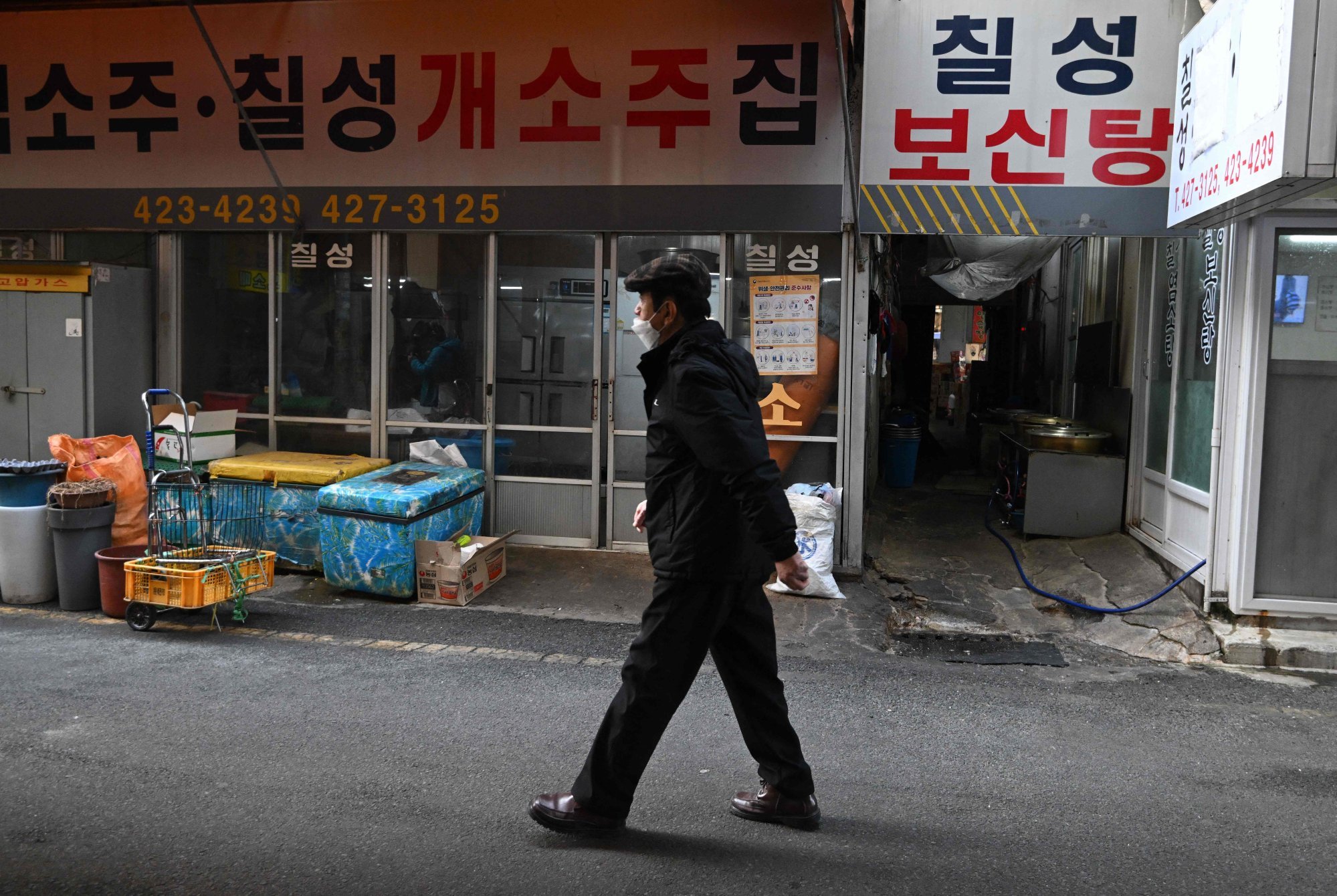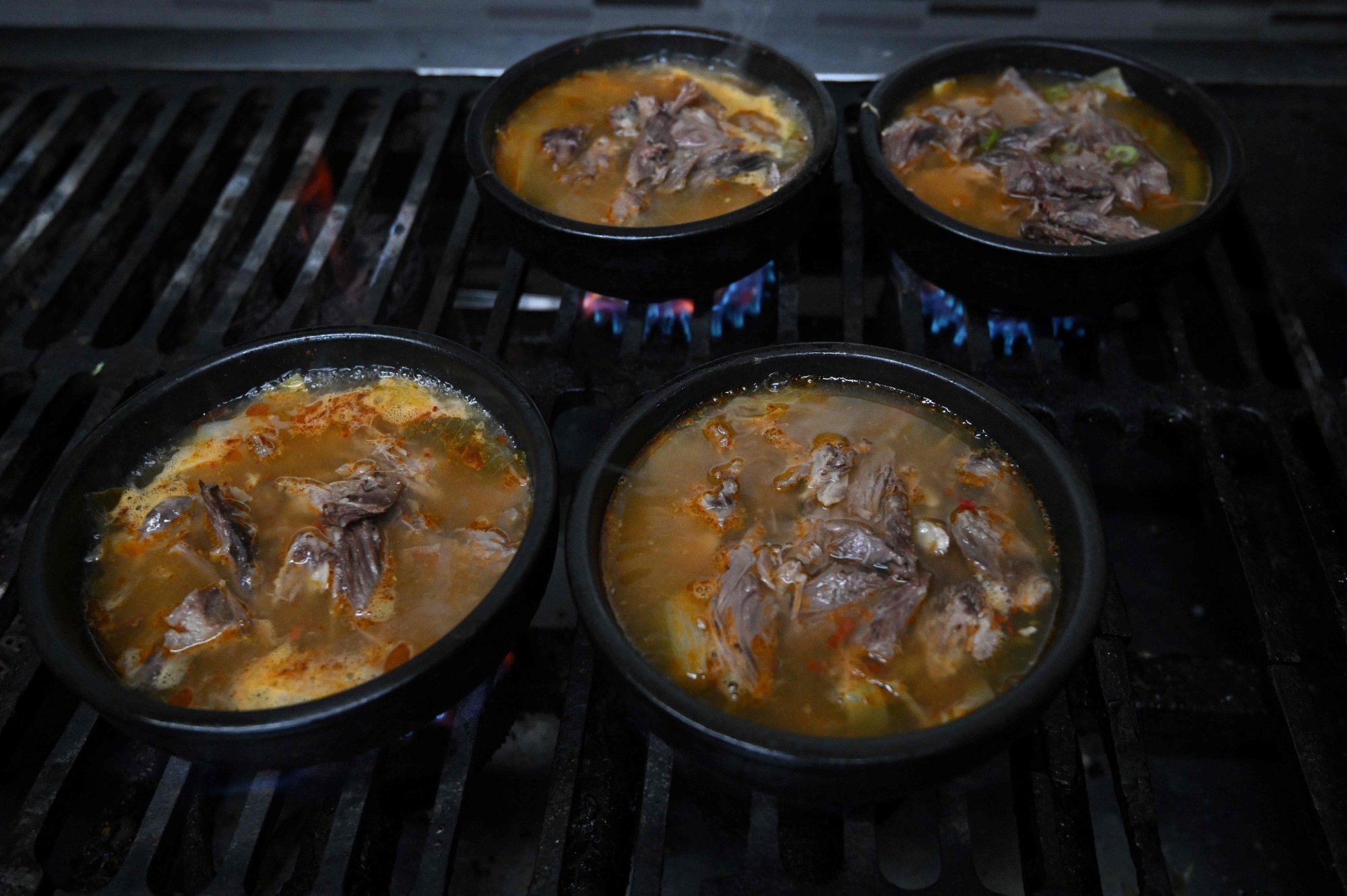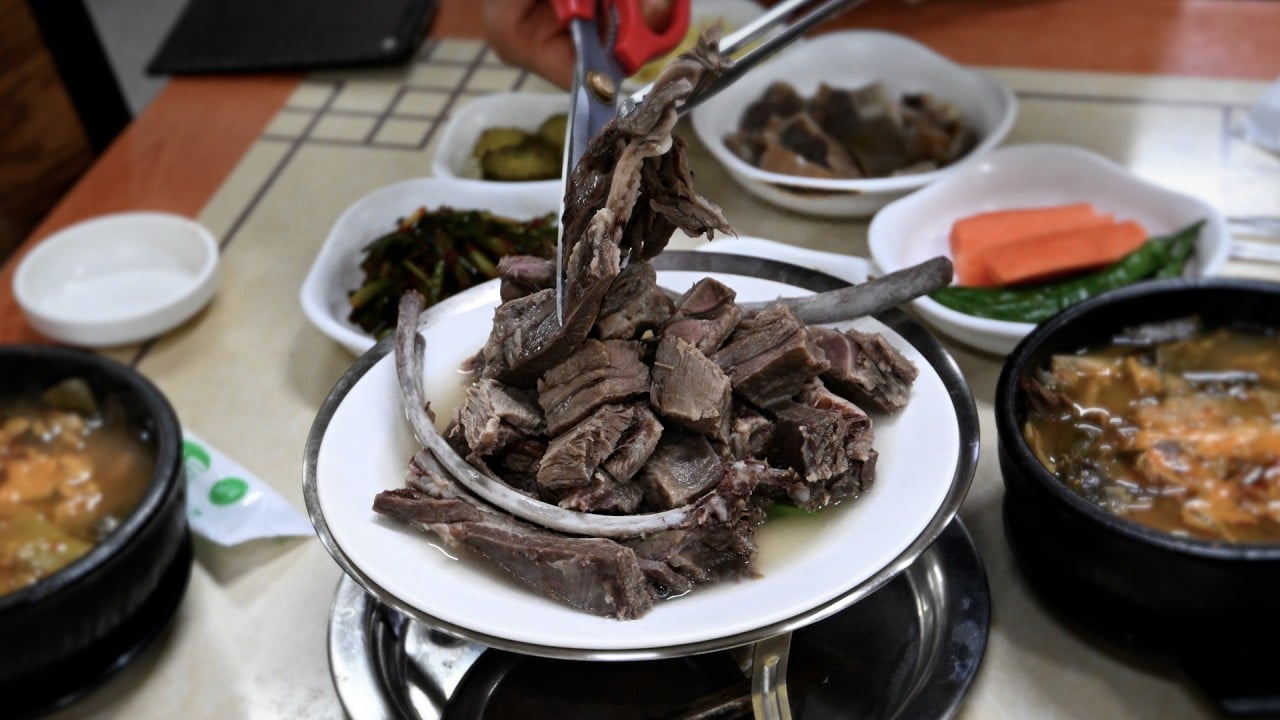South Korea faces pressure to save dogs, compensate breeders as it winds down meat trade
“It’s an evil, extra-constitutional law that takes away people’s right to eat, which is a basic right stipulated in the constitution,” said Joo Yeong-bong, head of the Korean Association of Edible Dogs, a coalition of breeders and sellers.
“It’s like forcing us out in the cold. We’re going to do everything we can to push for fair compensation,” he added.
‘Cows are living animals too’: vendors, customers oppose South Korea dog meat ban
‘Cows are living animals too’: vendors, customers oppose South Korea dog meat ban
In April 2022, South Korea’s agricultural ministry estimated that 1,100 farms were breeding 570,000 dogs for consumption in 1,600 restaurants.
However, the association said the figures were higher and that the ban would affect some 3,500 farms raising 1.5 million dogs and 3,000 restaurants nationwide.
It demanded the government pay breeders up to 400,000 won (US$300) per dog annually over the next five years to facilitate the closure of their farms, a figure officials rejected as “excessive”, citing a potential cost of 4 trillion won.
The government’s position is that the farmer should sell the remaining dogs or put them up for adoption during the three-year grace period.
From delicacy to taboo
The consumption of dog meat, once considered a delicacy, has declined sharply over the past decade or so, prompting some critics to question the need for a ban.
“Dog meat consumption has been decreasing fast over the past 15 years and it was expected to disappear sooner or later, even without a ban,” Joo Young-ha, a professor of anthropology at the Graduate School of Korean Studies, told This Week in Asia.
A Gallup poll last year showed only 8 per cent of respondents had tried dog meat in the past 12 months, a sharp drop from 27 per cent in 2015.
A 2023 survey commissioned by animal rights group AWARE indicated that 93.4 per cent of respondents would not consume dog meat in the future. Interestingly, a poll from the previous year revealed that six out of 10 South Koreans opposed legislating a ban on dog meat.

Chae Young-sam, 67, a retired government employee in southern Gwangju city, described how public attitudes towards the culinary habit had been changing over time by sharing his personal experience with dog meat in the 1970s, when he served in the combat police force as part of his mandatory military duty.
“I was told by senior members to slaughter a mongrel dog stationed as a guard at [a] checkpoint. It was really revolting to kill a familiar dog,” said Chae, adding he reluctantly carried out the task as he was the lowest-ranked member.
He hung “man’s best friend” on a tree branch, and with the help of senior colleagues, he learned how to prepare the meat for bosintang, a spicy stew.
Although repulsed by the idea, Chae said peer pressure compelled him to taste the soup, avoiding the meat. But surrounded by a squad that repeatedly indulged in the dish, Chae grew accustomed to eating the stew over his 33 months of service.

After his combat police service, Chae took part in a 1980 pro-democracy uprising in Gwangju. He was detained for weeks and tortured by martial law troops. Upon release, a close friend treated him to dog meat, a practice believed by older Koreans to have invigorating and restorative effects.
Since then, Chae has become an occasional consumer of dog meat, joining friends or colleagues at dog meat restaurants on hot summer days to “combat the heat”, as is believed by many.
“But over the past decade or so, fewer and fewer people have patronised bosintang houses because of the rising resentment against the presumably uncivilised culinary habit and abundance of other tasty food. And dog meat is not economical, with sukyuk (boiled dog meat slices) costing no less than 45,000 won (US$34),” he said.
Indonesia’s brutal meat market shuts, but some locals insist ‘no dog, no fun’
Indonesia’s brutal meat market shuts, but some locals insist ‘no dog, no fun’
Chae said many of the once-popular dog meat restaurants in Gwangju had consequently disappeared in the past several years, as was the case in other parts of the country.
The canine-eating tradition in South Korea came to global attention when Seoul hosted the 1988 Olympic Games, sparking calls for a boycott by activists.
Restrictions on the sale of dog meat, which officials in 1988 designated as “abominable food”, drove many restaurants into back alleys or into suburbs. Similar measures took place during the 2002 Korea-Japan World Cup and the 2018 Pyeongchang Winter Olympics.
As South Korea plans dog meat ban, farmers threaten to release 2 million canines
As South Korea plans dog meat ban, farmers threaten to release 2 million canines
Joo the professor said it was not fair for South Korea to be called out for its dog meat consumption as the practice also existed in other parts of Asia, including Cambodia, China, Indonesia and Vietnam.
In ancient Korea, it was not practical for people to raise pigs due to their insatiable appetites, and the territory lacked grasslands to keep sheep and goats. Cattle were used for tillage and their slaughter came with capital punishment.
Hence, Koreans had to resort to eating dogs as there were not enough sources of protein, aside from seafood and game that were hard to obtain, Joo said.

Meanwhile, the decline in dog meat consumption also comes as an increasing number of South Koreans keep dogs as pets.
A 2021 government survey suggested one in five households had pet dogs.
Among them are President Yoon Suk-yeol and his wife Kim Keon-hee, who have six dogs and five cats. The first lady was the most high-profile campaigner for a ban on dog meat consumption.
A 35-year-old herbal medicine practitioner in Gwangju, who identified herself only as Kim, said she occasionally visited dog meat restaurants, accompanying her grandmother who was a great bosintang fan.
“My grandmother loved bosintang and I liked it too,” she said. “But I stopped eating it after my grandmother died four years ago. No one else around me wants to eat it.”


